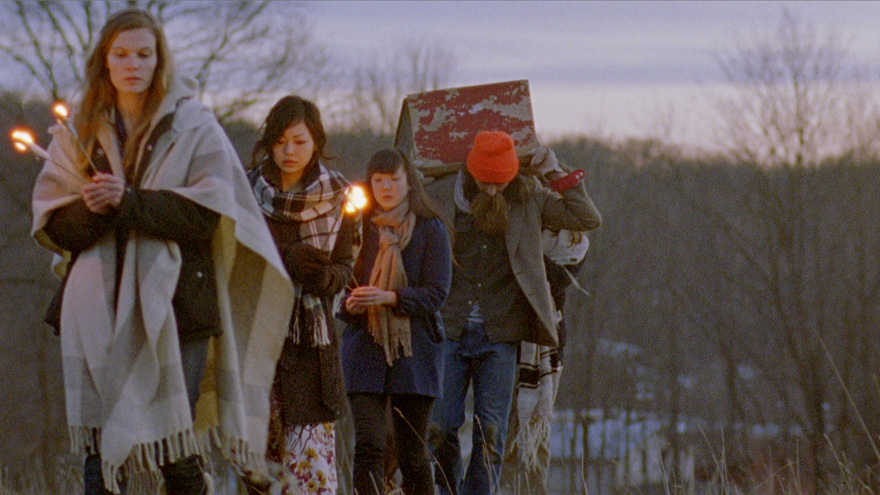 Back to selection
Back to selection
Five Questions with First Winter Director Ben Dickenson

To properly evoke the apocalyptic landscape and tone of his directorial debut, filmmaker Benjamin Dickinson lived like he filmed – amidst the chilling rural winter that his characters find themselves trapped within. Opting to forgo electricity and even food while filming the movie’s most desperate sequences, Dickinson and his crew lend what should prove to be a hard won authenticity to First Winter. Premiering in competition this Thursday at the Tribeca Film Festival, First Winter stars Lindsay Burdge, Paul Manza, and Kate Lyn Sheil.

Filmmaker: Talk to me a bit about the genesis of First Winter. Where did the idea for the film come from?
Dickenson: Lindsay Burge (Marie) and I started spending a lot of time at “Heartland” – Paul Manza’s (who plays Paul in the film) yoga retreat – a few years ago, and I really wanted to capture the experience of living in this type of community. Over the past couple of years, we’d been talking a lot about homesteading, and it became apparent rather quickly how difficult it is to really be self-sufficient. And then the post-apocalyptic scenario provided a way to explore that notion in an extreme way that was also very relevant to a lot of our modern anxieties. The second piece came when we were living in the house while Paul’s mom, Heidi, was dying. Paul took care of her as she died and we were there helping out, and that experience formed the rest of the movie. The film is dedicated to her.
Filmmaker: What kind of steps did you take to ensure that the shoot matched the film’s pseudo-apocalyptic tone?
Dickenson: It was sort of method filmmaking. All of the cast and crew holed up together in that farmhouse last winter for the duration of the shoot. We all cooked, ate, and lived together for a month. During the part where everyone is starving, we turned off the power and heated the place only with fire, and the cast fasted. We limited contact with the outside world as much as possible. I think it’s safe to say that it changed everyone. Hopefully for the better.
Filmmaker: What was the writing process like? How much did the script change once you got to set?
Dickenson: We actually were working mostly from an outline, and there was a fair amount of improvisation, which was amazing because we discovered deeper connections as we began filming. So it was an organic process. The dialogue scenes changed in rehearsal, and so I would go back and rewrite them before we filmed. It was a very collaborative process with the actors and the crew.
Filmmaker: What are your hopes for Tribeca? What kind of response do you hope First Winter elicits from audiences?
Dickenson: I’m so pleased to be premiering the film in New York City, so I can share it with the community that helped me to realize it. But I also hope the film reaches some people who aren’t familiar or even interested in yoga or eastern thought or homesteading. I feel it has something to say about the human condition in general….
Filmmaker: And what are your long-term goals for the film? Do you have other projects on the horizon?
Dickenson: I think the film will find its way. Once I finish it, it’s sort of out of my hands.
Projects on the horizon: Well, this film is about hippies, spirituality, and the “altermondalism” movement. My next film is about yuppies, conformity, and the cult of capitalism. And First Winter is sort of a Bergman movie, my next one is more of Antonioni type thing.
